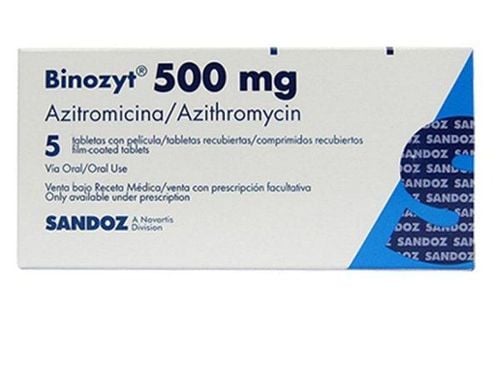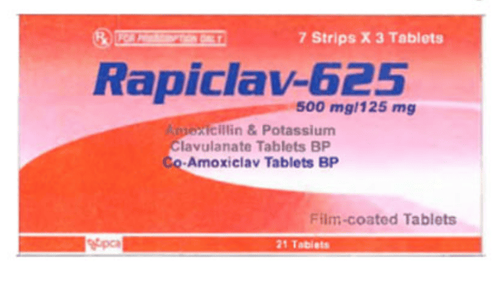Clarithromycin 500mg is an antibiotic that inhibits the growth of bacteria. The following is basic information about uses, dosages, precautions when using the drug, ...
1. Characteristics and ingredients of Clarithromycin 500mg
Clarithromycin 500mg belongs to macrolide antibiotic group. Each film-coated tablet contains 500mg of Clarithromycin along with other excipients. Clarithromycin is formulated in the form of film-coated tablets. Available packagings are: Boxes of 1 blister x 10 tablets; boxes of 2 blisters x 10 tablets or boxes of 10 blisters x 10 tablets.
2. Indications and contraindications of Clarithromycin 500mg
2.1. Indications for Clarithromycin 500mg
Clarithromycin is indicated for adults and children 12 years of age and older to treat infections caused by susceptible bacteria. Specifically:
Upper respiratory tract infections: Including diseases such as sinusitis, sore throat;
Lower respiratory tract infections:Pneumonia, acute bronchitis and chronic bronchitis;
Community acquired respiratory tract infection;
Skin infection and soft tissue (mild to moderate);
Clarithromycin can be combined with a proton pump inhibitor such as lansoprazole or omeprazole for Helicobacter Pylori infection treatment in patients with gastric ulcer.
2.2. Contraindications for using Clarithromycin 500mg
Clarithromycin 500mg is contraindicated in the following cases:
- Patients with a history of hypersensitivity to Clarithromycin or any of the drug's ingredients, or other macrolide antibiotics;
- The patient with hypokalemia;
- Patients with renal failure and liver failure;
- Patients with creatinine clearance < 30ml/min. No dosage adjustment is required for Clarithromycin 500mg tablets in patients with severe renal impairment;
- Clarithromycin should not be used in combination with ergotamine or dihydroergotamine because it may cause ergot poisoning;
- Concurrent use with cisapride, astemizole, pimozide, or terfenadine, since it may cause arrhythmias or QT prolongation. Do not prescribe for patients with a history of prolonged QT or ventricular arrhythmias
- Do not use clarithromycin concomitantly with HMG-CoA enzyme inhibitors (statins) metabolized by CYP3A4 (including simvastatin or lovastatin) because it may increase the risk of myopathy, and rhabdomyolysis. If you are taking these drugs, treatment should be discontinued while taking clarithromycin;
- Do not use clarithromycin in patients taking colchicine due to strong inhibition of CYP3A4.

3. Dosage and administration of Clarithromycin 500mg
Take Clarithromycin 500mg orally. Dosage instruction:
3.1. For adults and children 12 years of age and older
Treatment of respiratory tract, skin and soft tissue infections: 500mg, 2 times/day for 6 - 14 days;
Treatment of HP in patients with gastric and duodenal ulcers: Treatment for 6 - 14 days with the following options:
- Clarithromycin 500mg (2x daily) + lansoprazole 30mg (2x daily) + amoxicillin 1000mg (2x daily);
- Clarithromycin 500mg (2x daily) + lansoprazole 30mg (2x daily) + metronidazole 400mg (2x daily);
- Clarithromycin 500mg (twice daily) + omeprazole 40mg (2x daily) + amoxicillin 1000mg (2x daily) or metronidazole 400mg (2x daily);
- Clarithromycin 500mg (2x daily) + amoxicillin 1000mg (2x daily) + omeprazole 20mg/day;
- Clarithromycin 500 mg (3x/day) for 14 days, with omeprazole 40 mg (1 time/day) for 28 days.
3.2. Other populations
- Do not use Clarithromycin 500mg for children under 12 years old;
- Elderly people can take the same doses as adults;
- Patient with renal failure: No dosage adjustment is required except in patients with severe renal impairment (creatinine clearance less than 30ml/min);
- Patient with liver failure: Clarithromycin dosage adjustment is required.
4. Cautions when using Clarithromycin 500mg
When using Clarithromycin 500mg, caution should be exercised as follows:
- Use with caution in patients with liver or kidney failure;
- Long-term use of clarithromycin may cause bacteria to become insensitive to the drug, leading to diarrhea and pseudomembranous colitis. Therefore, monitoring and treatment are needed. Antibiogram regularly to have appropriate treatment direction;
- There have been cases of clarithromycin treatment associated with severe myasthenia gravis;
- Colchicine toxicity occurs when used concomitantly with clarithromycin, especially in elderly patients. Therefore, when using the two drugs concomitantly, symptoms of colchicine toxicity should be closely monitored;
- Be careful when using Clarithromycin 500mg for elderly patients, coronary artery disease, heart failure, slow heart rate,... or when used with other drugs that prolong the QT interval. Do not use the drug in patients with prolonged QT interval, ventricular arrhythmia, or heart disease;
- Caution when coadministering clarithromycin with drugs metabolized by CYP3A4 and HMG-CoA reductase inhibitors;
- Use caution when using clarithromycin concomitantly with aminoglycosides and benzodiazepines;
- Discontinue clarithromycin if serious acute hypersensitivity reactions occur including Anaphylactic shock, toxic epidermal necrolysis, Steven-Johnson syndrome, purpura,...;
- Caution prescribing clarithromycin in combination with statins. Coadministration of clarithromycin with simvastatin or lovastatin is contraindicated;
- Concomitant use of clarithromycin and other hypoglycemic oral medications (such as sulphonylureas) or insulin may cause hypoglycemia. Clarithromycin may cause hypoglycemia when used concomitantly with pioglitazone, nateglinide, repaglinide, and rosiglitazone. Therefore, when patients take the drug, blood glucose levels should be monitored;
- Concomitant use of clarithromycin with the anticoagulant warfarin increases the risk of serious bleeding, increases INR and prothrombin time. Therefore, INR and prothrombin time should be monitored in patients taking clarithromycin concomitantly with oral anticoagulants;
- Clarithromycin can cross the placenta. There is no evidence that the drug affects the fetus, but the benefits and risks of using the drug for pregnant women should still be considered and careful monitoring is needed. In addition, clarithromycin can be transmitted through breast milk . Therefore, breastfeeding women need to be careful when taking medicine;
- The drug can cause dizziness, loss of balance, and disorientation, so be careful when taking the drug if you have to drive or operate machinery,...
5. Side effects of Clarithromycin 500mg
Mild side effects include:
- Stomach irritation, vomiting and diarrhea;
- Change in taste, mouth discomfort, tooth discoloration;
- Headache;
- Mild skin itching or rash;
- Vaginal itching or discharge.
Severe side effects that should be reported to your doctor immediately include:
- Allergic reaction: Difficulty breathing, rash, swelling of your face or lips, tongue, or throat;
- Headache, dizziness, chest pain, fast or pounding heartbeat, shortness of breath, fainting;
- Watery or bloody diarrhea;
- Fever, swollen glands, body aches, flu symptoms, or new or worsening cough;
- Skin rash, easy bruising or bleeding, numbness, muscle pain or weakness, severe itching;
- Confused, vomiting, swelling, rapid weight gain, urinating more than usual, or urinary retention;
- Having hearing problems;
Serious skin reactions include: fever, sore throat, burning eyes, swelling of the face or tongue, pain, red or purple skin rash that spreads, blisters, or peels.
Serious liver side effects that should be reported to your doctor include:
- Mild fever, itchy skin;
- Nausea, loss of appetite, upper abdominal pain;
- Yellow skin or eyes;
- Dark urine and clay-colored stools.

6. Overdose, missed dose, and storage of Clarithromycin 500mg
- Overdose: Symptoms may include abdominal pain, nausea, vomiting, and diarrhea. The patient should immediately call the emergency center for assistance in removing the drug from the stomach,...;
- Missed dose: If you miss a dose, take it as soon as possible. If it is close to the next dose, skip the missed dose and take the next dose at the scheduled time;
- Storage: Store Clarithromycin 500mg at temperatures below 30°C, away from direct sunlight. Keep out of reach of children and pets.
Clarithromycin 500mg is a drug that is used to treat some diseases caused by bacteria. When administering the drug, patients must strictly follow the doctor's instructions on dosage, duration of use, etc. to ensure optimal treatment effectiveness. In case of reactions warning of serious side effects, patients should immediately notify the doctor.
To arrange an appointment, please call HOTLINE or make your reservation directly HERE. You may also download the MyVinmec app to schedule appointments faster and manage your reservations more conveniently.













